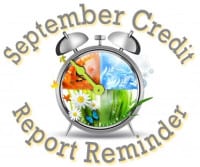2020 has been filled with challenges – COVID 19, wildfires, hurricanes, tornadoes and more. What will come next? Are you ready for whatever comes your way?
Are you prepared for a fire? Several months back, the home next to us had a fire and we were talking to the firemen about many things. We discussed an emergency action plan. We talked about several things that we needed to be prepared:
- Carbon monoxide / smoke detectors in the home
- Escape plan for evacuation
- Meeting place to gather outside the home
We personally were fine with #1 and #2 but had not considered #3. We have wired carbon and smoke detectors in our home and just replaced them this summer. When was the last time you replaced yours? Hardwired detectors need to be replaced every 10 years. For battery operated ones, when was the last time you tested them and replaced the batteries? Please check into this for your own well-being,
The fireman suggested the meeting place for us to be across the street on the neighbor’s porch. That way everyone could meet and know the others are safe.
How well are you prepared for a disaster? Take the time to be prepared if disaster strikes in your neighborhood.
If you have to evaluate your home in minutes, what do you need to do and bring with you? You will need food, water, clothing, medicine, important papers and more if you have pet(s). Be prepared. Here are several lists from Ready.gov to help you prepare all different types of disaster kit.


 Now if you are someone who has accumulated debt in 2020 (or previously), lets talk about ways to payoff your debt. You have heard the ads on the radio and see the commercials on TV, but are they legit? Maybe, but do you want to try and find out you have been scammed?
Now if you are someone who has accumulated debt in 2020 (or previously), lets talk about ways to payoff your debt. You have heard the ads on the radio and see the commercials on TV, but are they legit? Maybe, but do you want to try and find out you have been scammed? our fridge and freezer is a huge expense, that you probably weren’t expecting. Look into reimbursement from your renter’s / homeowner’s insurance (and possibly the power company) to ease your budget.
our fridge and freezer is a huge expense, that you probably weren’t expecting. Look into reimbursement from your renter’s / homeowner’s insurance (and possibly the power company) to ease your budget.

